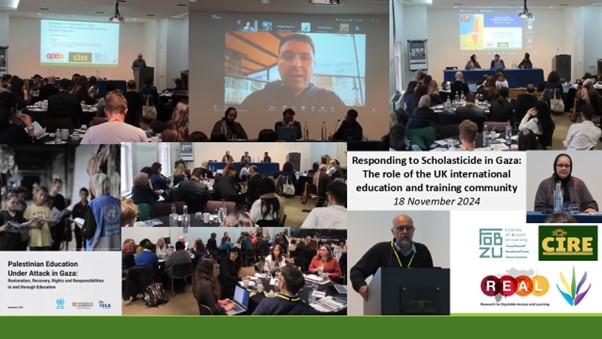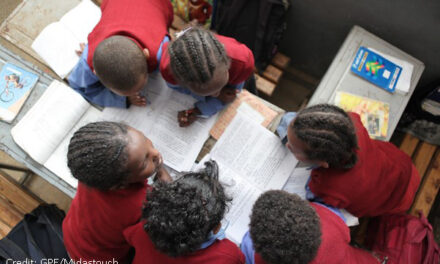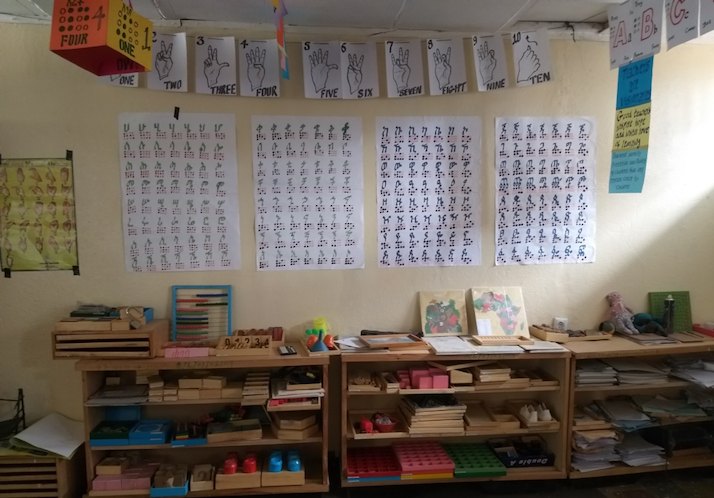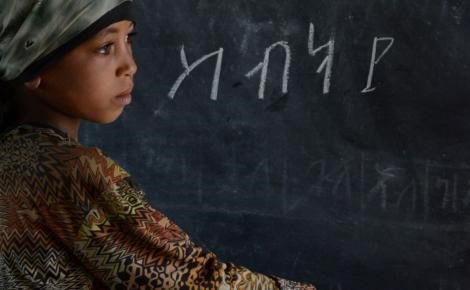On 18 November, 2024, a conference titled Responding to ‘Scholasticide’ in Gaza: The Role of the UK International Education and Training Community was held in London and online. The event brought together Palestinian academics, UK-based educators, and experts to discuss the devastating impact of the ongoing genocide on Gaza’s education system. Organised by UKFIET, FOBZU, CIRE at the University of Bristol, and the REAL Centre at the University of Cambridge, the conference aimed to explore the destruction of Gaza’s universities and schools and to propose actionable solutions to support recovery efforts.
Members of the Emergency Committee of Universities in Gaza, the official body mandated to collectively represent Gaza’s three major non-profit universities—the Islamic University of Gaza, Al-Azhar University of Gaza, and Al-Aqsa University—opened the conference with the first panel. The first session was chaired by Omar Shweiki, Director of Fobzu. Dr Radwan Abu Rukba, from Al-Aqsa University, joined the panel online from Khan-Younis, south of Gaza, and spoke about the psychological toll on students and faculty, many of whom are suffering from trauma. He highlighted the urgent need for infrastructure support, including reliable internet access and basic technology, while stressing that an immediate and permanent ceasefire remains the most urgent need.
Dr Nasreddine Almezaini, from the Islamic University of Gaza, shared grim statistics, including €200 million in infrastructure losses and the killing of 119 academic staff, including three current and former university presidents. Despite this, he emphasised the resilience of Gaza’s educational institutions and called for international partnerships to help rebuild. Dr Ahmed Abu Shaban, from Al-Azhar University, discussed how the war has paralysed university operations, with institutions no longer able to rely on student fees. Faculty members continue to teach voluntarily, without pay. Along with his colleagues, he stressed the urgent need for international support to strengthen Gaza’s universities and avoid measures that might weaken them, such as schemes that seek to replace their role or support that bypasses them. He highlighted Isnad as a model for empowering Gaza’s universities.
The conference also highlighted the historical context of the destruction of Palestinian education. Dr Mezna Qato, a historian of Palestinian education at the University of Cambridge, explained how “scholasticide” is part of a broader Israeli colonial effort to erase Palestinian identity. She argued that despite this, Palestinians have always found ways to innovate in education as an act of resilience. Dr Abdel Razzaq Takriti, from Rice University, drew attention to the complicity of Western academia in the ongoing genocide, urging scholars to refuse collaboration with Israeli institutions. He also emphasised the urgency of collective support for Palestinian educational institutions, as key pillars of Palestinian people and their existence on their land in Palestine, and therefore, the targets of the “scholasticide.”
The second session of the conference, chaired by Professor Pauline Rose, from the University of Cambridge, focused on the broader crisis in Gaza’s schools, with a discussion on the international community’s role in addressing the crisis. Unai Sacona, UNRWA’s Deputy Director of Education, described the unprecedented destruction of Gaza’s schools, with 93% of them either destroyed or damaged. He called for international advocacy against the organised campaigns to dismantle and delegitimise UNRWA, stressing that the international community needs to carry the voices and needs of the children and displaced people of Gaza.
Professor Yusuf Sayed, from the University of Cambridge, shared findings from the REAL Centre and Centre for Lebanese Studies’ report, Palestinian Education Under Attack in Gaza, which outlined the significant learning losses caused by the ongoing war due to school closures as well as war-induced trauma, compounded by the COVID-19 pandemic and limited humanitarian aid. Despite these challenges, the report highlighted the continued dedication of teachers, who are offering recreational activities, foundational learning and psychosocial support to children in the face of crisis. The continued support is provided by local organisations, with support from UNRWA and other international agencies. Ayman Qwaider, from the Enabling Education Network, emphasised the need for equitable partnerships in rebuilding Gaza’s education system, ensuring that Palestinian voices are central to recovery efforts.
During breakout discussions, participants identified key priorities for supporting Gaza’s education sector. They emphasised the need for sustainable academic partnerships between UK and Palestinian universities, strengthening the integrity of Gaza’s institutions. Rebuilding Gaza’s universities and schools was identified as an urgent priority, with a special emphasis on creating trauma-informed spaces for both students and teachers. Funding scholarships within Gaza to sustain local institutions and provide support for faculty and research programmes was another critical recommendation. The conference also underscored the importance of amplifying Palestinian voices and documenting the destruction of educational institutions as part of the global effort to build solidarity.
The conference concluded with a strong call to action. It stressed that rebuilding and sustaining Gaza’s universities should be a global priority, with both public pledges and international partnerships necessary to safeguard the future of these institutions. There was also an urgent call for continued support for UNRWA, which plays a critical role in providing education for Palestinian refugees. Universities and donors were urged to prioritise funding scholarships within Gaza to ensure the survival of local institutions. A call was made for the formation of a Network of Educationalists for Palestine, a collective of UK-based academics committed to long-term support for Palestinian higher education. Finally, the conference emphasised the importance of providing trauma-informed support for educators and students affected by the ongoing violence.
In conclusion, the conference highlighted the existential threat facing Gaza’s education system and the extraordinary resilience of its academic community. The testimonies of Gaza’s academics underscored the critical need for both immediate and sustained support. As Dr Ahmed Abu Shaban had stated, “We are here; we’re not just buildings. We’re a community, and we persevere.” The conference made it clear that the international education community has a shared responsibility to stand with, advocate for Gaza’s students and educators and develop partnerships with Gaza’s educational institutions to ensure their survival and recovery. A full summary report is available here, including with detailed recommendations.





